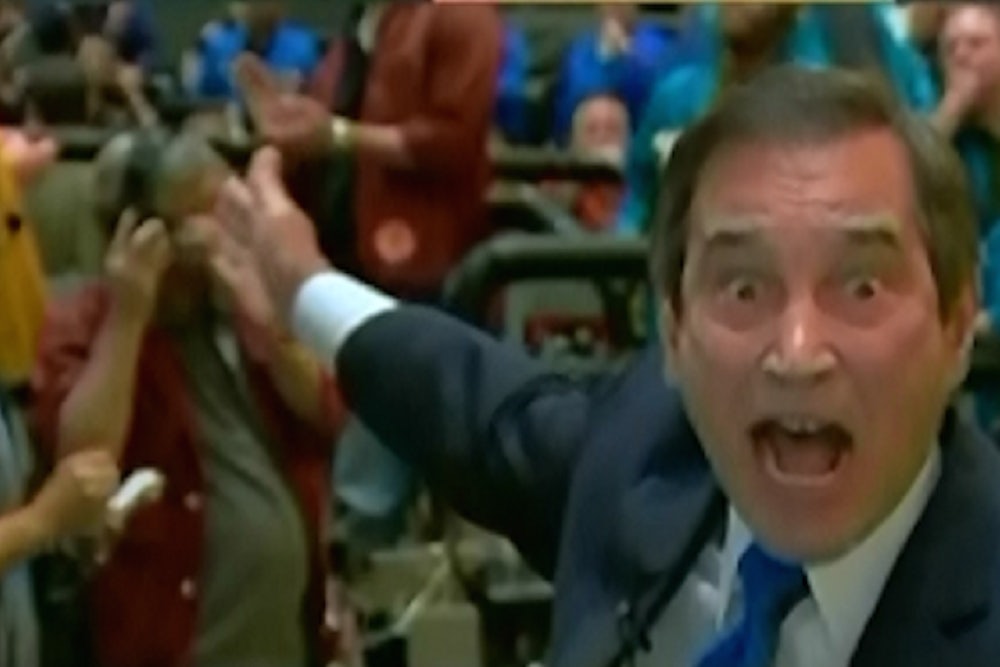CNBC’s Rick Santelli, often credited with inspiring the Tea Party movement, made news Monday for yet another outburst on air. He repeated his usual rant against the Federal Reserve’s loose monetary policy, prompting CNBC senor economics reporter Steve Liesman to unleash his own diatribe about Santelli’s consistently failed economic forecasts. “Rick, it’s impossible for you to have been more wrong,” he said.
Many in the economic community watched this live episode with schaudenfraude, but Santelli is hardly alone in being wrong about inflation. Many financial professionals and economists refuse to revise their opinions in light of the recovery, and this video shows the degree of stubbornness facing Federal Reserve Chair Janet Yellen as she tries to move Fed policy along an appropriate path.
In 2009, under the leadership of former Federal Reserve Chair Ben Bernanke, the Fed cut interest rates to zero. It has used unconventional monetary policy tools, like buying hundreds of billions of dollars of Treasury bonds and mortgage-backed securities, to spur economic growth. Those policies worried many conservative pundits who saw the easy money as a gateway for higher inflation. Santelli led the charge against the Fed’s policies, saying in 2011, “I understand that the Fed wants to appear to be trying to make a difference, but I really think that all the history of lower rates what it has not done for employment, mortgages, or housing, really makes this a futile effort.” In 2012, he professed concerns about hyperinflation seen in the Weimar Republic in the 1920s. Bernanke, and now Yellen, declined to raise rates in response to such pressure.
A smart move, it turned out. Other central banks, like the European Central Bank, weren't able to withstand similar pressure—and that’s partly why the recovery in the U.S. has been much stronger than in the Eurozone. Meanwhile, the doomsday scenarios predicted by Santelli et al have not come to pass. Interest rates have stayed low despite huge federal deficits. Inflation has been almost non-existent, with it constantly undershooting the Fed’s 2 percent target.
You would expect those outcomes to humble Santelli, convincing him and his fellow inflation hawks to rethink their economic models. Instead, as the economic recovery seems to be kicking into second gear, Santelli and other conservatives who wrongly predicted inflation are, once again, calling for the Fed to raise interest rates. Santelli argues that government statistics are not accurately measuring inflation, even though an inflation index constructed by a private sector company has nearly identical numbers.
“I think we need to get back to a more steak and potatoes, mundane, less volatile form of central banking,” he said Monday on CNBC. “We're not in a crisis.” Liesman and his fellow analysts tried to convince Santelli otherwise, to no avail. Joshua Brown, a financial advisor at Ritholtz Wealth Management, asked Santelli whether his opposition five years ago to the Fed’s bond-buying strategy might be playing a role in his current analysis. Of course not, Santelli responded.
But Liesman finally had enough of Santelli’s hysterical screaming. "It's impossible for you to have been more wrong, Rick,” he said. “Your call for inflation, the destruction of the dollar, the failure of the U.S. economy to rebound. Rick, it's impossible for you to have been more wrong. Every single bit of advice you gave would've lost people money, Rick."
It’s easy to pick on Santelli for his failed forecasts, constant fear-mongering, and refusal to believe economic statistics. Liesman, a frequent on-air combatant of Santelli, is right to call him out. But there are many other economists with a wide audience that are calling for the Fed to raise rates. Those rate hikes will have to come eventually—otherwise high inflation will materialize. Santelli is right about that. But the key question is when the Fed should raise rates. Do it too soon, and it will choke off the recovery. Do it too late, and inflation could become a problem.
In fact, for the first time during the Obama presidency, there are signs that inflation may be ticking up. This is a good thing. It was bound to happen as economic growth increased and the labor market tightened, leading to higher wages and prices. We haven’t seen wage growth yet, but anecdotal evidence suggests that it could come this fall. That would be great news, as workers have barely seen any wage growth in the past decade and a half. Yellen has already demonstrated her commitment to ending that streak—to waiting until wage growth actually materializes before deciding to raise interest rates. In the meantime, she must ignore pundits like Santelli.
